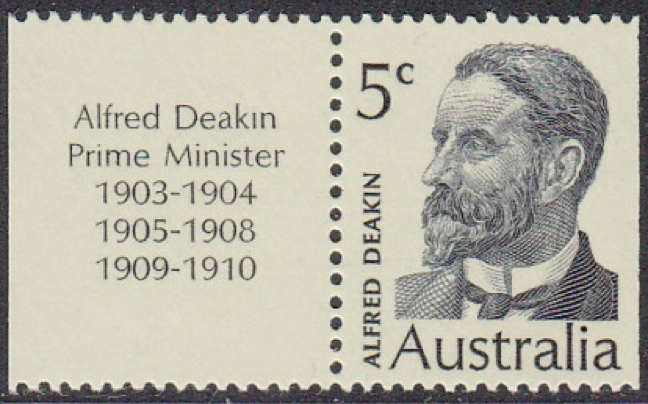by Alan Currie
Two men were walking down a street in the Melbourne CBD late one afternoon in 1878, deep in conversation. The older man, distinguished-looking founder of The Age newspaper David Syme, was serious and quite determined. The younger man, up-and-coming The Age journalist Alfred Deakin, was quite brilliant and was putting up a good fight as they debated one of the most important issues of the day.
The two men had been grappling with the issue for weeks. The question was: ‘Should Australia have trade protection or not?’ In other words, should people selling things from other locations have to pay a special fee called a tariff to protect the businesses of people who made and sold things locally, or should Australia have open borders and allow free trade, without tariffs, between all of its colonies and, ultimately, with the entire world?
David Syme finally managed to convince his young protégé to become a trade protectionist. By the end of nineteenth century and for most of the twentieth century, trade protection and tariffs became normal. But more importantly, Syme became Deakin’s greatest supporter for many years and was the main reason why Deakin was given the opportunity to enter politics in 1879.

At only 22 years old, Alfred Deakin stepped into the political limelight. He was elected to Parliament, only to resign on his very first day because of a mistake made at a polling booth. The polling booth had run out of voting forms and had had to close with forty more people still to vote.
Deakin made the decision to resign. He felt that the principle of fair and properly conducted elections was more important than his own career. While this caused a lot of problems for the government of the time, his integrity won admiration from the people of Victoria.
Deakin’s political career was not over, though. He was elected again, and for 10 years, from 1890 to 1900, he served as a colonial backbencher tirelessly promoting the idea of federating (uniting) the colonies of Australia into one nation (‘Federation’). He turned down a more highly paid role as a government minister, preferring to focus on the work he was doing. He believed he had a duty to encourage Australia to fulfil its divine destiny and become a great, unified nation.
Alfred Deakin loved books, and during his youth he would often get lost in adventure stories like Robinson Crusoe and the story of Aladdin in The Arabian Nights. It was said that he would read 100 books per year, which gave him an amazing breadth of knowledge and insight. He could converse with anyone on any subject and speak with amazing power and grasp of the English language.
He loved reading so much that one of his high school teachers, concerned that he was too preoccupied with his imaginary world, talked to him and inspired him to apply himself to his studies. This eventually led to his studies at Melbourne University, where he gained a law degree.
Alfred Deakin had grown up during the time of the gold rush, when it seemed everyone in the world wanted to come to the colonies to start a new life and maybe ‘strike it rich’ on the Victorian goldfields. All this amazing new wealth and immigration caused a massive land boom, but when the gold ran out, ‘boom’ turned to ‘bust’ and in the 1890s there was an economic depression. Along with many others, Deakin lost his and his father’s savings, but unlike others he kept his promises and paid off all his debts. (An interesting fact of history is that American President Abraham Lincoln was also a lawyer who got into financial trouble, but like Deakin, he also was very diligent in making sure he made things right, paying off his business partner’s debts.)
Once Federation was achieved, Deakin became Australia’s first Attorney-General and served under Edmund Barton, Australia’s first Prime Minister. In those early years as Attorney-General, and later when he became the second, fifth and seventh Prime Minister of Australia, Deakin played a crucial role in creating important legislation that established the High Court, the Australian Navy, copyright laws, animal protection laws, customs, tariff and quarantine laws, and the Bureau of Meteorology.
All of Alfred Deakin’s life he had a keen desire to understand spiritual truth. He knew God was enabling him to do his work and fulfil his duty to his country. In a letter to his children in 1890 he said:
Christ himself is the central figure of humanity and marks the greatest height yet attained in moral insight in religious feeling. No character in history, no founder of a religion, no moral philosopher, no religious teacher, can be placed beside him.
And as Prime Minister in 1905, Deakin said, ‘Jesus Christ is the life of the present, the light of the future and the hope of the world.’ In his private journal between 1884 and 1913 he wrote down over 400 prayers to God.
Alfred Deakin was loved and appreciated by the Australian people and was respected by many leaders both in Australia and in other countries. He was a great ambassador for Australia in world affairs and his contribution to the foundation of the country was profound. He gave his life to the service of the nation he loved and Australia benefited from his devotion to this work.
The editorial in Brisbane’s Daily Mail at the time of his death stated:
It is perhaps quite safe to say that no great leader in Australian public life has been gifted with the attractive personality, instinctive courtesy and innate gentlemanliness that characterised Alfred Deakin. None amongst us could be named more worthy of respect.
The Daily Mail, Brisbane, 9 October 1919
Deakin was offered many titles like ‘Sir’ and ‘Lord’ but he rejected them all, preferring to simply be known as ‘Mr Deakin’. Many who loved him knew him as ‘Affable Alfred’. (‘Affable’ means friendly and easy to talk to.)
He died on 7 October 1919 and is buried in the St Kilda Cemetery in Melbourne.
Further reading:
